Welcome User
Relevance
Consult Hepatology Doctors Online - Hepatologists (19 doctors)

Dr. Srinivasa Reddy
Hepatologist
12 Years • MBBS, MD (General Medicine), DM (Hepatology),ASGE
Hyderabad
Myra Liver & Gastro Care, Hyderabad

Dr. E Prabhakar Sastry
General Physician/ Internal Medicine Specialist
40 Years • MD(Internal Medicine)
Manikonda Jagir
Apollo Clinic, Manikonda, Manikonda Jagir
(150+ Patients)
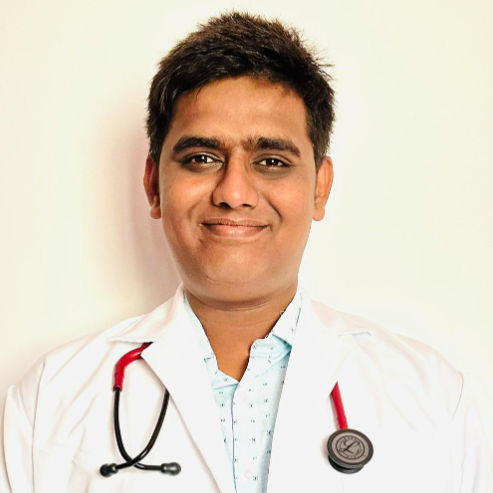
Dr. Sushith C
General Physician
2 Years • MBBS
Bengaluru
PRESTIGE SHANTHINIKETAN - SOCIETY CLINIC, Bengaluru

Dr. Pavan Kumar Y M
Gastroenterology/gi Medicine Specialist
5 Years • MBBS, MD Medicine, DM Gastroenterology
Bengaluru
Apollo Medical Center, Marathahalli, Bengaluru

Dr. Akshatha Manjunath
General Surgeon
8 Years • MBBS, MS
Bangalore
Apollo Clinic Bellandur, Bangalore

Dr. Pukhraj Singh Jeji
Gastroenterology/gi Medicine Specialist
13 Years • MBBS, MD ( Internal Medicine ), DM ( Gastroenterology ), Consultant - Gastroenterology
Bhubaneswar
Apollo Hospitals Old Sainik School Road, Bhubaneswar
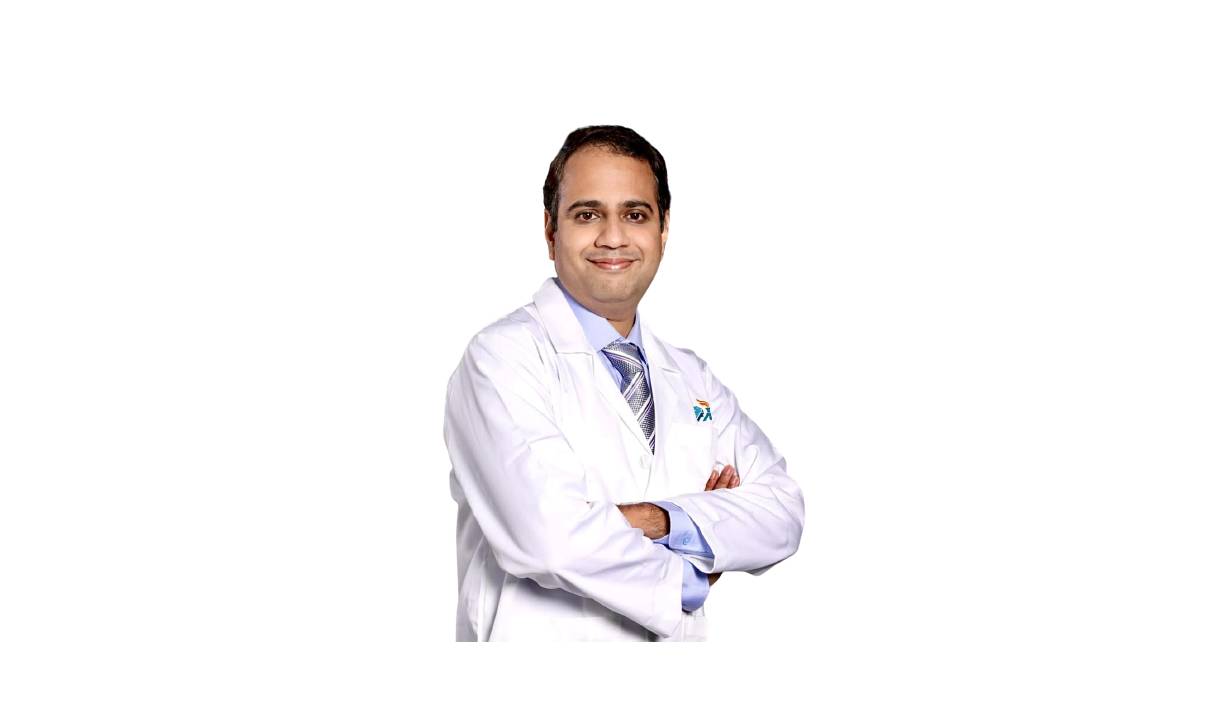
Dr Amey Sonavane
Gastroenterology/gi Medicine Specialist
11 Years • "MBBS, DNB (Internal Medicine) DNB (Gastroenterology) "
Mumbai
Apollo Hospitals CBD Belapur, Mumbai
(100+ Patients)
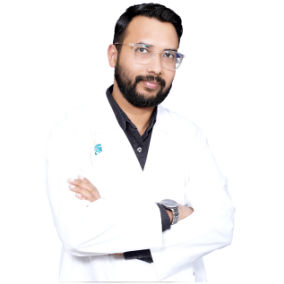
Dr. Aakash Garg
Gastroenterology/gi Medicine Specialist
12 Years • MBBS, DNB (Medicine), DrNB (Gastroentrology).
Bilaspur
Apollo Hospitals Seepat Road, Bilaspur
(150+ Patients)

Dr U V U Vamsidhar Reddy
Hepatologist
10 Years • MBBS, MD (JIPMER), DM (Hepatology, PGIMER)
Chennai
Apollo Hospitals Greams Road, Chennai
(75+ Patients)

Prof. Dr. Kanhu Charan Das
Gastroenterology/gi Medicine Specialist
24 Years • MBBS, MD (Medicine) DM (Gastroenterology & Hepatology, CMC, Vellore). Advanced Proceduralist (ERCP, EUS, POEM & ESD) Senior Consultant - Gastroenterologist.
Bhubaneswar
Apollo Hospitals Old Sainik School Road, Bhubaneswar
(300+ Patients)

Dr. Madhu Sudan Modi
Surgical Gastroenterologist
35 Years • Gold Medalists. MBBS (Hons.), MS (Surgery), DNB (Surgical Gastroenterology), FRCS (England), MRCS (England), FACS (USA), FHPB (Germany), FLTx (Korea & UK), FMAS, , PDCC (TMH Mumbai). Senior Consultant - GI Surgery, GI Cancer, Laparoscopy, Hepato-Biliary-Pancreatic & Liver Transplant Surgeon.
Bhubaneswar
Apollo Hospitals Old Sainik School Road, Bhubaneswar
Dr. Sandeep Kudale
Paediatric Gastroenterologist
16 Years • MBBS,MD, DCH (Diploma in Child Health), MRCPCH (UK),Fellowship in Paediatric Hepatology and Liver Transplant , Fellowship in Paediatric Gastroenterology and Nutrition, FPGH (India)
Mumbai
Apollo Hospitals CBD Belapur, Mumbai
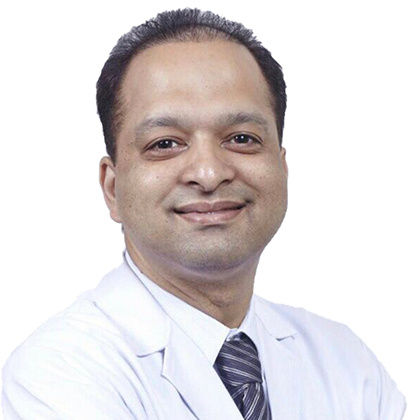
Dr. Rajeev Shandil
Gastroenterology/gi Medicine Specialist
15 Years • MBBS, DNB (Internal Medicine), DNB (Gastroenterology)
Delhi
Apollo Hospitals Indraprastha, Delhi
(150+ Patients)
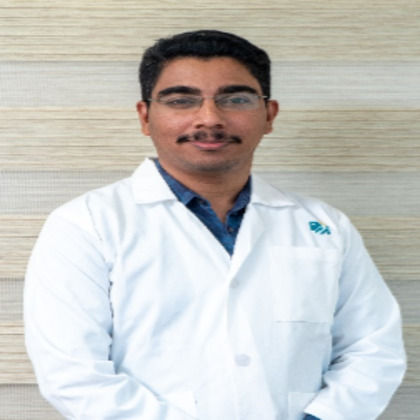
Dr. Aswin S. Krishna
Hepatologist
10 Years • MBBS, MD (Internal Medicine,MMC), DM (Hepatology, MMC), PDF(Fellowship in Liver Transplanatation)
Chennai
Apollo Hospitals Greams Road, Chennai
(125+ Patients)
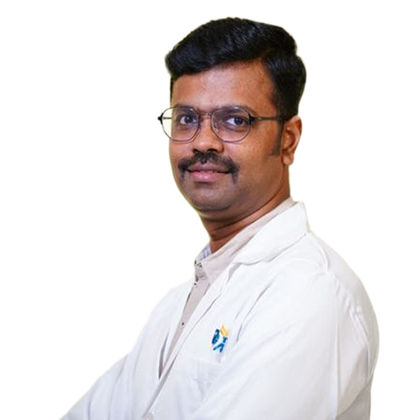
Dr. Kumaragurubaran. S
Hepatologist
0 Years • MBBS.,MD.,FPIC.,DM.,
Tiruchirappalli
Apollo Speciality Hospitals Old Palpannai, Tiruchirappalli
(50+ Patients)
Book Consult for Hepatology Online
Booking an appointment with a hepatologist at Apollo 24|7 is quick and convenient. Our user-friendly platform allows you to schedule online or phone consultations with top hepatologists from trusted hospitals and clinics. With a wide range of appointment slots available, you can easily find a time that suits your schedule. Our experienced hepatologists are dedicated to providing personalised care and helping you manage liver-related conditions effectively. Don't wait any longer; book your appointment with a hepatologist at Apollo 24|7 today and take the first step towards better liver health.
What is Hepatology?
Hepatology is a branch of medicine concerned with the study, prevention, diagnosis, and management of diseases that affect the liver, gallbladder, biliary tree, and pancreas. The speciality is pivotal in healthcare due to the critical functions these organs play, including detoxification, protein synthesis, and the production of biochemicals necessary for digestion.
Hepatologists address a range of conditions from acute liver failure and hepatitis to complex cases like liver cancer and cirrhosis. Given the increasing prevalence of liver diseases globally, hepatology remains a crucial field for improving public health outcomes and advancing medical treatments.
Who is a Hepatologist?
A hepatologist is a medical doctor specialising in hepatology, the branch of medicine that focuses on the liver and related organs. To become a hepatologist, individuals must complete extensive training, including medical school, general internal medicine residency, and finally a fellowship in gastroenterology or hepatology.
These specialists possess a deep understanding of liver diseases, their progression, and the latest treatment options.
Hepatologists diagnose and manage a variety of conditions such as hepatitis, fatty liver disease, cirrhosis, and liver cancer. Their expertise is vital in crafting management plans that can range from lifestyle modifications and medication to more complex interventions like liver transplants.
What Does a Hepatologist Do?
These medical professionals play a crucial role in managing complex liver diseases, which often require detailed assessments and tailored treatment plans.
Diagnosis and Evaluation: Hepatologists conduct comprehensive evaluations using diagnostic tests such as blood tests, ultrasounds, and liver biopsies to accurately diagnose liver diseases. They assess the severity and progression of conditions like hepatitis, fatty liver disease, and cirrhosis.
Treatment Planning: After diagnosis, hepatologists develop and implement treatment plans that may include medication, lifestyle changes, and in severe cases, coordinating liver transplants. They manage patients’ care from the initial diagnosis through to treatment and follow-up.
Research and Education: Many hepatologists are also involved in research and clinical trials aiming to find new treatments and understand liver diseases better. They frequently participate in educational programmes to train medical students and residents.
Patient Consultations: Regular consultations with patients help monitor the effects of liver disease on overall health. Hepatologists provide dietary advice, manage symptoms, and adjust treatments as necessary.
Multi-disciplinary Collaboration: Hepatologists often work in a multi-disciplinary team with other specialists to provide holistic care to patients with complex conditions. This team might include oncologists, surgeons, radiologists, and pathologists.
The role of a hepatologist is integral to managing health conditions that are not only prevalent but also high in morbidity and mortality, making their expertise essential in the field of gastroenterology and internal medicine.
What are the Other Sub-specialities of Hepatology?
Hepatology encompasses various sub-specialities, each targeting specific aspects of liver health. Understanding these can help identify the appropriate liver specialist for particular conditions:
Transplant Hepatology: This sub-speciality focuses on managing patients before and after liver transplantation. Specialists in this field evaluate transplant candidates, oversee post-operative care, and manage long-term complications to ensure successful organ integration.
Paediatric Hepatology: Tailored to the needs of infants, children, and adolescents, this area addresses liver diseases affecting younger patients. A liver doctor in this sub-speciality deals with congenital liver conditions, paediatric liver transplants, and diseases like biliary atresia.
Chronic Liver Disease Management: Specialists focus on the long-term care of patients with chronic liver diseases. They manage progression, prevent complications, and maintain liver health through ongoing medical therapies and monitoring.
Alcoholic Liver Disease: This sub-speciality deals with liver problems caused by excessive alcohol consumption, including fatty liver, alcoholic hepatitis, and cirrhosis. Specialists here provide treatments that may include detox programs and lifestyle counselling.
Viral Hepatitis Treatment: This area concentrates on infections caused by hepatitis viruses (A, B, C, D, and E), offering antiviral treatments and monitoring to prevent liver damage.
Non-Alcoholic Fatty Liver Disease (NAFLD): Specialists in NAFLD, often referred to as fatty liver disease doctors, manage this increasingly common condition characterised by fat accumulation in the liver in non-drinkers.
Liver Cancer (Hepatocellular Carcinoma): This sub-speciality involves the diagnosis and treatment of liver cancer, using methods ranging from surgery and radiological interventions to novel oncological treatments.
Hepatic Encephalopathy: Specialists manage this complex condition where liver dysfunction leads to brain impairment. Treatment focuses on reducing toxin buildup in the blood that the damaged liver cannot process.
Liver Biopsy and Imaging Techniques: Advanced diagnostic techniques fall under this area. Specialists use biopsy and state-of-the-art imaging to diagnose and monitor liver conditions, providing essential data for effective treatment planning.
Each sub-speciality plays a vital role in the broader scope of hepatology, providing targeted care for diverse liver-related conditions. Consulting with a gall bladder specialist might also be necessary when conditions extend beyond the liver, affecting the biliary system.
What are the Hepatology Examinations or Tests Performed by the Hepatologist?
Hepatologists perform a range of diagnostic tests and examinations to evaluate liver health, diagnose disorders, and monitor the progression of diseases. Here are the most common methods used within this speciality:
Liver Function Tests (LFTs): These blood tests measure the levels of enzymes and proteins in the blood that indicate how well the liver is functioning. Elevated or reduced levels can signal liver damage or disease.
Imaging Tests: Techniques such as ultrasound, CT scans, and MRI are crucial for visualising the liver and surrounding structures. These images help detect abnormalities like tumours, cysts, and changes in liver size or texture.
Liver Biopsy: In this procedure, a small sample of liver tissue is taken using a needle inserted through the skin. It's then analysed under a microscope to detect liver disease, inflammation, or cancer.
FibroScan: Also known as transient elastography, this non-invasive test uses ultrasound waves to measure the stiffness of the liver, which helps assess fibrosis (scarring) and cirrhosis.
Endoscopic Retrograde Cholangiopancreatography (ERCP): This procedure combines endoscopy and X-ray imaging to examine the bile ducts, gallbladder, and pancreatic duct. It's often used to identify and treat blockages or leaks in these ducts.
Hepatic Venous Pressure Gradient (HVPG) Measurement: This test measures the blood pressure in the portal vein and is used to assess the severity of portal hypertension, often associated with cirrhosis.
These examinations are fundamental for hepatologists to provide accurate diagnoses and develop effective treatment plans. If you're experiencing symptoms of liver disease, you might consider to book hepatologist appointments for a comprehensive evaluation.
What are the Common Conditions & Diseases that Hepatologists Treat?
Hepatologists manage a wide range of liver-related and gastrointestinal diseases, which are often a major concern for patients due to their impact on overall health. Below are 15 common conditions:
Fatty Liver Disease: Excess fat accumulation in the liver, often linked to obesity and lifestyle.
Viral Hepatitis (A, B, and C): Infections that cause inflammation and damage to the liver.
Alcoholic Liver Disease: Liver damage due to prolonged alcohol abuse.
Non-Alcoholic Steatohepatitis (NASH): A severe form of fatty liver disease involving inflammation.
Cirrhosis: Advanced liver scarring caused by chronic liver disease.
Liver Cancer (Hepatocellular Carcinoma): The most common form of liver malignancy.
Autoimmune Hepatitis: The body’s immune system mistakenly attacks liver cells.
Liver Fibrosis: Thickening and scarring of liver tissue.
Hepatic Encephalopathy: Brain dysfunction caused by liver failure.
Gallstones and Bile Duct Disease: Conditions affecting bile flow.
Primary Biliary Cholangitis (PBC): Chronic disease causing bile duct damage.
Haemochromatosis: Excess iron accumulation in the liver.
Wilson’s Disease: A genetic condition causing copper build-up in the liver.
Liver Abscess: Pockets of infection or pus within the liver.
Portal Hypertension: Increased blood pressure in the liver’s portal vein.
Reasons to See a Hepatologist
If you experience persistent liver-related symptoms or conditions, consulting a hepatologist is essential for timely diagnosis and care.
Unexplained Jaundice: Yellowing of the skin or eyes.
Chronic Fatigue: Long-term tiredness linked to liver dysfunction.
Abnormal Liver Function Tests: Indicative of potential liver disease.
Abdominal Pain or Swelling: Especially in the upper right side.
Unexplained Weight Loss: Common in advanced liver conditions.
Hepatitis Diagnosis: For specialised care and treatment plans.
Alcohol-related Concerns: Assessment of liver health and damage.
For added convenience, online hepatologist consultation services allow patients to seek expert advice remotely when immediate care is required.
What Types of Procedures do Hepatologists Perform?
Hepatologists perform a variety of procedures to diagnose, manage, and treat liver-related conditions. These procedures are broadly divided into two categories: therapies and surgeries.
Top Therapies in Hepatology:
1. Liver Function Tests (LFTs): Blood tests to assess liver enzyme and protein levels.
2. FibroScan: A non-invasive test measuring liver stiffness to detect fibrosis.
3. Endoscopic Retrograde Cholangiopancreatography (ERCP): Used to diagnose and treat bil duct and pancreatic disorders.
4. Paracentesis: Removal of fluid from the abdomen to relieve pressure caused by ascites.
5. Hepatic Venous Pressure Gradient (HVPG): Measures blood pressure in the portal vein for cirrhosis evaluation.
6. Therapeutic Endoscopy: Used to manage gastrointestinal bleeding caused by liver-related issues.
7. Intravenous Therapies: Administering fluids, medication, or nutrition for liver support.
Top Surgeries in Hepatology:
8. Liver Biopsy: A procedure to extract liver tissue for microscopic examination.
9. Liver Transplantation: Replacing a diseased liver with a healthy donor liver.
10. Cholecystectomy: Surgical removal of the gallbladder to treat gallstones or infections.
11. Biliary Stenting: Placement of stents to open blocked bile ducts.
12. Hepatic Resection: Partial removal of the liver to treat tumours or damaged areas.
13. TIPS Procedure (Transjugular Intrahepatic Portosystemic Shunt): Creates a bypass for blood flow to relieve portal hypertension.
14. Radiofrequency Ablation (RFA): A minimally invasive treatment to destroy liver tumours.
15. Drainage of Liver Abscess: Surgical intervention to remove infected pus pockets.
Hepatologists carefully choose these procedures based on the severity and type of liver condition. The hepatologist fee may vary depending on the complexity of the procedure and treatment involved.
Why Choose an Apollo 24|7 Hepatologist?
Apollo 24|7 hepatologists are highly skilled and experienced in diagnosing and treating a wide range of liver diseases. With their extensive expertise and access to state-of-the-art facilities, they provide personalised care tailored to each patient's unique needs. Our liver specialists stay up-to-date with the latest advancements in hepatology, ensuring that patients receive the most effective and innovative treatment options available.
Apollo 24|7 offers seamless access to consultations, both online and in-clinic, making it convenient for patients to receive expert care from the comfort of their homes or at their nearest Apollo hospital.
By choosing an Apollo 24|7 hepatologist, patients can be assured of receiving comprehensive, patient-centric care that focuses on achieving the best possible outcomes for their liver health.
What to Expect When Visiting a Hepatologist?
When visiting a hepatologist, patients can expect a thorough evaluation to understand their liver health. The consultation focuses on identifying symptoms, diagnosing conditions, and discussing personalised treatment plans to manage liver-related issues effectively.
Initial Consultation: The hepatologist will review your medical history, current symptoms, and any previous test results. They may ask about lifestyle habits, alcohol intake, and family history of liver disease.
Physical Examination: A physical assessment may include checking for jaundice, swelling, or tenderness in the abdomen.
Diagnostic Tests: You may undergo blood tests like Liver Function Tests (LFTs), imaging scans (ultrasound, CT, or MRI), or a liver biopsy for further evaluation.
Discussion of Results: The hepatologist explains test outcomes and recommends suitable treatment options, such as medication, dietary changes, or further procedures.
Treatment Plan: A customised plan will be created to manage the condition, which may include follow-up visits for ongoing care.
Reading hepatologist reviews can help patients feel confident about choosing the right specialist. If you are searching for a hepatologist near me, ensure they are experienced in addressing your specific liver concerns.
How Can I Get an Appointment With a Hepatologist?
Booking an appointment with a skilled hepatologist at Apollo 24|7 is a simple and convenient process:
Online Booking: Visit the Apollo 24|7 website and navigate to the "Book Appointment" section. Select "Hepatology" from the list of specialities and choose your preferred hepatologist from the available options. Pick a suitable date and time slot, provide your personal details, and confirm the appointment.
Apollo 24|7 App: Download the Apollo 24|7 app on your smartphone, log in or create an account, and select the "Consult" option. Choose "Hepatology" as the speciality and follow the prompts to book an appointment with your preferred liver specialist.
Offline Booking: You can also call the Apollo 24|7 helpline or visit your nearest Apollo hospital's reception to schedule an appointment with a hepatologist. Provide your personal details, preferred date and time, and the receptionist will assist you in booking the appointment.
Referrals: If your primary care physician or another specialist recommends consulting a hepatologist, they may provide you with a referral. You can use this referral to book an appointment with the specified liver specialist through the Apollo 24|7 website, app, or offline channels.
FAQs
What is hepatology?
Hepatology is a medical speciality focusing on the liver, gallbladder, bile ducts, and pancreas. It involves diagnosing, treating, and managing conditions like hepatitis, fatty liver disease, cirrhosis, and liver cancer. Hepatologists play a critical role in maintaining liver health and preventing complications associated with liver-related disorders.
Is a hepatologist a cancer doctor?
Hepatologists are specialists in diagnosing and treating liver diseases, including liver cancer. While they focus on liver-related conditions, they often collaborate with oncologists for advanced cancer treatments, such as chemotherapy or liver surgery, ensuring patients receive comprehensive care tailored to their diagnosis and stage of illness.
What drinks are good for your liver?
Drinks like water, green tea, coffee, and lemon water are beneficial for liver health. Green tea and coffee contain antioxidants that may reduce inflammation, while water flushes toxins. Avoid sugary or alcoholic drinks, as they can worsen liver conditions, including fatty liver disease and cirrhosis.
How to know if the liver is unhealthy?
Signs of an unhealthy liver include jaundice (yellowing skin/eyes), unexplained fatigue, dark urine, pale stools, abdominal swelling, and persistent nausea. If you experience these symptoms, consult a hepatologist for proper diagnosis and care, as early detection is crucial for effective liver treatment.
What is a hepatology scan?
A hepatology scan refers to imaging tests like ultrasound, CT scans, MRI, or FibroScan, which evaluate liver structure and function. These scans help detect abnormalities such as fatty liver, tumours, or fibrosis, allowing hepatologists to diagnose conditions accurately and monitor disease progression effectively.
How to check liver function at home?
Liver function cannot be accurately checked at home. However, monitoring symptoms like jaundice, fatigue, or swelling can indicate potential problems. For precise assessment, blood tests like Liver Function Tests (LFTs) and imaging scans must be conducted under medical supervision.
Is rice good for fatty liver?
Brown rice can be beneficial for fatty liver due to its higher fibre content, which helps improve metabolism and reduce fat buildup in the liver. Avoid refined white rice, as it may contribute to weight gain and insulin resistance, which can worsen fatty liver disease.
Which fruit is best for the liver?
Berries such as blueberries and cranberries are excellent for liver health. They are rich in antioxidants that protect the liver from damage and reduce inflammation. Other beneficial fruits include apples, grapes, and citrus fruits like oranges, which aid detoxification and support liver function.
What signs and symptoms of complications should patients watch for?
Patients with liver diseases should be aware of signs and symptoms that may indicate complications, such as jaundice (yellowing of the skin and eyes), ascites (fluid accumulation in the abdomen), variceal haemorrhage (bleeding from enlarged veins in the oesophagus or stomach), and hepatic encephalopathy (mental confusion or coma due to liver failure). If any of these symptoms occur, patients should seek medical attention promptly.
How can patients prepare for an appointment with a hepatologist?
To prepare for an appointment with a hepatologist, patients should be aware of any pre-appointment restrictions, such as fasting for blood tests. They should bring a list of their current medications, including over-the-counter drugs and supplements, and be ready to discuss their medical history and symptoms. Patients should also prepare questions they may have for the hepatologist to make the most of their appointment.